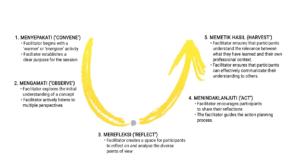The father of Indonesian national education, Ki Hadjar Dewantara, expounded upon three significant leadership philosophies:
- Ing Ngarso Sung Tulodo (Leaders must serve as role models)
- Ing Madyo Mangun Karso (Leaders must inspire and ignite enthusiasm)
- Tut Wuri Handayani (Leaders must provide support from behind)
These philosophies have gained relevance as they form the underlying concepts of the progressive Emancipated Curriculum, which advocates for school leaders to embody the role of “instructional leader.”
This viewpoint is consistently reiterated by Nadiem Makarim, the Minister of Education, Culture, Research and Technology, emphasising the need for school leaders to strike a delicate balance between their operational responsibilities and their instructional leadership roles within their schools. In his words, “The primary duty of a school principal is to mentor the teachers within the school, guiding them towards becoming better educators”.
The necessity for transformation as instructional leaders has resonated with the school supervisors and principals in the districts of Kota Kediri and Kabupaten Lumajang, where the STiR programme is being implemented in partnership with local NGO Yayasan Bakti Pendidikan Unggul (YBPU). At the district level, there are already established platforms for teacher professional development known as Kelompok Kerja Guru (KKG), or Teacher Working Groups. However, these KKGs became inactive for two years during the pandemic.
To address this issue and improve the learning support and experience for teachers within these forums, STiR and YBPU have collaborated closely with the educational leaders in the districts. Together, we are working to revive these KKGs and create a renewed sense of engagement and participation among teachers.
As part of our ongoing commitment to address educational priorities and needs at both the national and district levels, we have identified the enhancement of facilitation skills as a primary focus area for this year. We are closely working alongside the District Education Agencies of the two districts to achieve this objective.
We have introduced a facilitation framework called 5M. This framework outlines a series of steps designed to enhance participant engagement and foster two-way interaction, incorporating key elements from Otto Scharmer’s Theory U, which provides a strong foundation for our approach. (For more information, see here and here.)
Bapak Suyono, a school supervisor, expressed his excitement to apply these principles during his upcoming KKG facilitator training in Kota Kediri, emphasising, “The key lies in maintaining a spirit of continuous experimentation, reflection and evaluation. This is how we drive improvement.”

By employing this model during facilitation sessions within the teacher working group forums, we hope to achieve:
- Enhanced engagement and connection: By establishing clear expectations and fostering trust, individuals are more likely to actively engage and participate. This sets a positive tone and creates a comfortable environment where participants feel connected to one another.
- Increased empathy: The observation encourages participants to suspend judgement and explore multiple perspectives. This cultivates a greater sense of empathy and understanding among participants.
- Deeper reflection: The reflection phase provides valuable space for participants to reflect on their own values, leading to new insights and perspectives that may not have otherwise emerged.
- Iterative action: The action planning phase emphasises experimentation and iteration, enabling participants to test new ideas and approaches in a structured manner.
- Consolidation and dissemination of insights: The harvesting phase allows participants to consolidate their learnings and insights and share them with others. This ensures that the transformative potential extends beyond the session, impacting a wider audience.
Bapak Heri, a school supervisor in Kabupaten Lumajang, utilised the framework to conduct sessions. He reflects on his previous approach, stating, “In the past when facilitating, my focus was solely on ensuring that participants achieved the session objectives. However, this approach overlooked the potential for participants to have diverse perspectives that differed from my own. The 5M framework has allowed me to delve deeper and be more inclusive of participants’ thoughts and ideas. Consequently, participants have expressed feeling more acknowledged and listened to, rather than feeling compelled to conform.”

